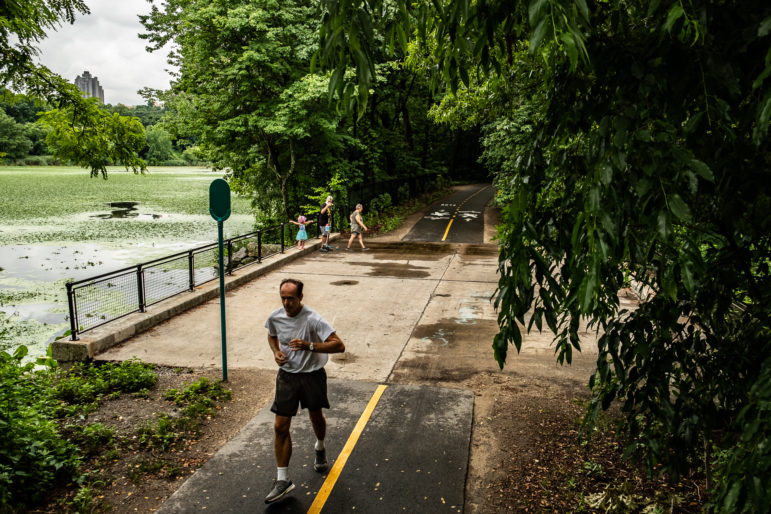In addition to paying for more than 200 park rangers and patrol officers—positions cut from the previous year’s budget—the allocated money will support community gardens, forestry management and equity initiatives.

Adi Talwar
Old Putnam Trail located in Van Cortlandt Park in the BronxListen to an audio version of the this story here:
Cuts made to the city’s Department of Parks and Recreation last year due to the COVID-19 pandemic will be reversed in this year’s budget deal—and then some.
The $98.7 billion fiscal year budget adopted on Wednesday includes about $620 million for the Parks Department, according to the mayor’s office.
This represents a major increase from the $503 million earmarked for the agency in the budget adopted in June 2020 for fiscal year 2021, which was down $84 million from the year before the pandemic. Amid the isolation of the crisis, residents flocked to local parks, one of the few public spaces where people could spend time outside their homes during lockdown.
“Many of these have served as refuges to New Yorkers over the past year,” said City Council Speaker Corey Johnson, noting that the 2022 budget will also reverse pandemic-related cuts to cultural institutions and the Department of Sanitation. Slashes to the latter’s budget resulted in a halting of the city’s curbside composting program and the resignation of its commissioner and current mayoral candidate Kathyrn Garcia.
The budget announcement comes as Mayor Bill de Blasio’s office plans a citywide reopening party on Central Park’s Great Lawn with headliners Paul Simon, Bruce Springsteen and Jennifer Hudson.
“As we emerge from the pandemic, this restoration and additional allocation gives us the resources we need to remain steadfast in our commitment to providing equitable access to quality parks and greenspaces for all New Yorkers,” said NYC Parks Commissioner Mitchell J. Silver. “This truly will be the Summer of NYC.”
A portion of the Parks funding will support “Play Fair,” a campaign overseen by New Yorkers for Parks and a coalition of about 300 groups and organizations dedicated to maintaining open spaces, including natural areas and forests in the city.
Usage of those areas, which encompass about one-fourth of the city’s parks systems, increased about 65 percent during the pandemic, according to Sarah Charlop-Powers, executive director of Natural Areas Conservancy, one of the nonprofits involved in Play Fair.
Chalrop-Powers called last year’s budget reductions a “huge blow,” especially because of the additional foot traffic.
“Unfortunately, it corresponded with increased visitation to all parks across the city,” she said.
This resulted in increased litter and fewer staff to clean up green spaces, remove invasive species and plant trees.
The $79.6 million in funding for city parks programs that Play Fair championed ended up being about $700,000 more than the coalition had initially called for in this year’s budget.
In addition to paying for more than 200 park rangers and patrol officers—positions cut from the previous year’s budget, the mayor’s office said—the allocated money will support community gardens, forestry management and equity initiatives.
“We’re relieved to see funding restored for the critical maintenance and operations of New York City parks, and we’re pleased to see all of the Play Fair Coalition’s priorities funded for the new fiscal year to ensure New Yorkers have access to the safe, clean, and accessible parks they deserve,” Adam Ganser, executive director of New Yorkers for Parks, told City Limits.
Investing in equitable access to parks and trees has been a sticking point for environmentalists around the country and during the city’s mayoral primary election.
A recent report by American Forests, which measured the number of trees in neighborhoods around the United States compared with the racial and economic demographics in those areas, found that low-income communities and communities of color had fewer trees than richer, mostly white neighborhoods. The report said that New York would need to add 1.5 million trees in order to provide equitable distribution of tree cover across every neighborhood.
The next year’s budget could allocate more funding toward the city’s parks programs, depending on who is elected mayor this November. The votes are still being tallied for the Democratic primary and results are uncertain, following a flub by the Board of Elections last week.
The three leading candidates have all made varying forms of commitment to invest in green spaces. Brooklyn Borough President Eric Adams, who has maintained his lead in the race and is presumed to be the Democratic nominee in the November general election, has promised to ensure everyone lives at least 15 minutes from a park. Both Adams and former Sanitation Commissioner Kathryn Garcia has pledged to dedicate 1 percent of the New York City budget for parks, and Maya Wiley said in an interview with the New York League of Conservation Voters that she would commit to funding park equity.
“Our parks are lifesavers,” said Wiley.
Liz Donovan is a Report for America corps member.








